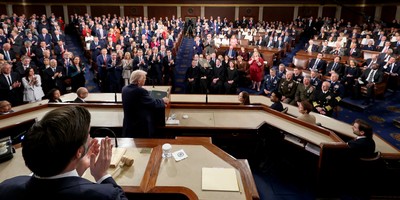If Attorney General Eric H. Holder Jr.'s prosecutor knocks on Dick Cheney's door asking about CIA interrogations, Mr. Cheney should refuse to say a single word. If the Holder Justice Department tries to drag the former vice president into court to force him to speak, President Obama will be on the receiving end of a stern judicial rebuke.

Knowing that his national security record made him look weak and unsteady, Mr. Obama painted himself as a tough commander in chief. He appointed hawks to several foreign policy posts in his Cabinet and recruited a good staff for his National Security Council. He even kept George W. Bush's defense secretary, Robert M. Gates.
He went to the CIA in April to give a speech (he's very good at that) to tell our intelligence community that he supports and will defend them and to encourage them to aggressively protect our nation. Even when the left-wing nuts clamored for vengeance for Bush-era anti-terrorist policies, he declared that he wanted no action taken against the CIA.
Some who thought Mr. Obama lacked the fortitude to protect America wondered if they might have misread him, that maybe he was tougher than they thought.
Nope. Turns out that when push comes to shove, it's exactly what they feared.
Mr. Holder -- who serves at Mr. Obama's pleasure to carry out the White House's law-enforcement agenda -- has launched a witch hunt against the CIA. He's ignoring the president's public instructions by appointing a special prosecutor to investigate possible wrongdoing by intelligence officers.
These allegations already had been reviewed by career prosecutors in the Justice Department who decided against pursuing them. But history suggests that once a special prosecutor is appointed, inquiries tend to build a full head of steam and eventually spin out of control.
Recommended
Should that happen here, it's possible that the prosecutor will go up the food chain and ask Mr. Cheney what he knew about CIA interrogations.
If that happens, the former vice president should tell them to go pound sand. In other words, he should invoke executive privilege.
Presidents and senior officials working closely with him can cite executive privilege in refusing to divulge certain types of information in legal or court proceedings.
President Bush specifically tasked Mr. Cheney to be intimately involved in the White House's national security decisions, drawing upon Mr. Cheney's vast experience as a former White House chief of staff and wartime defense secretary.
Like the president, the vice president is a constitutional officer. His office is not created by Congress the way departmental heads and other Senate-confirmed officials are. He is completely removed from congressional oversight and shares the president's status as being above ordinary government operations.
Some issues are more protected by executive privilege than others. According to the federal courts, the most-protected are diplomatic secrets, military matters and "sensitive national security interests." You don't have to be a constitutional lawyer to guess rightly that CIA interrogations of terrorists captured during wartime fit neatly into the third category.
The courts also have held that former presidents retain executive privilege after they leave office (although the privilege's strength is somewhat diminished), so Mr. Cheney can continue to assert it.
If the Justice Department wants to press this issue, Mr. Holder would have no choice but to take Mr. Cheney to court seeking an order for him to answer the prosecutor's questions. Under current precedent, the odds are heavily in favor of Mr. Cheney's winning.
Dick Cheney has always been a tough customer. He should be one now and help put an end to Team Obama's latest political stunt.























Join the conversation as a VIP Member